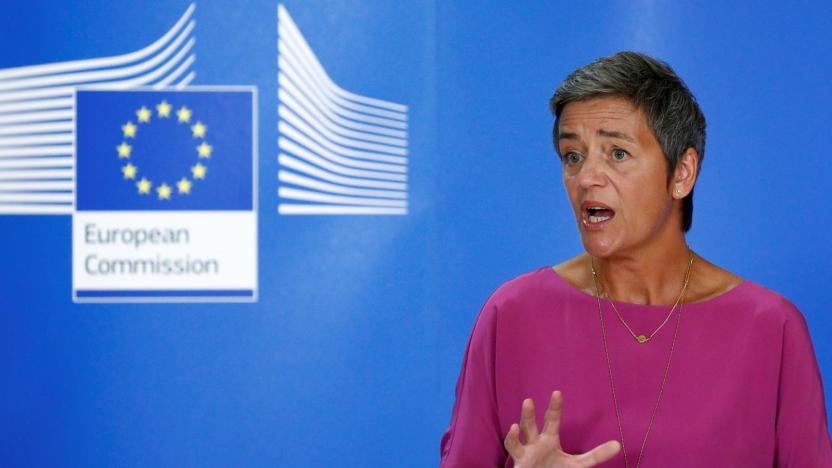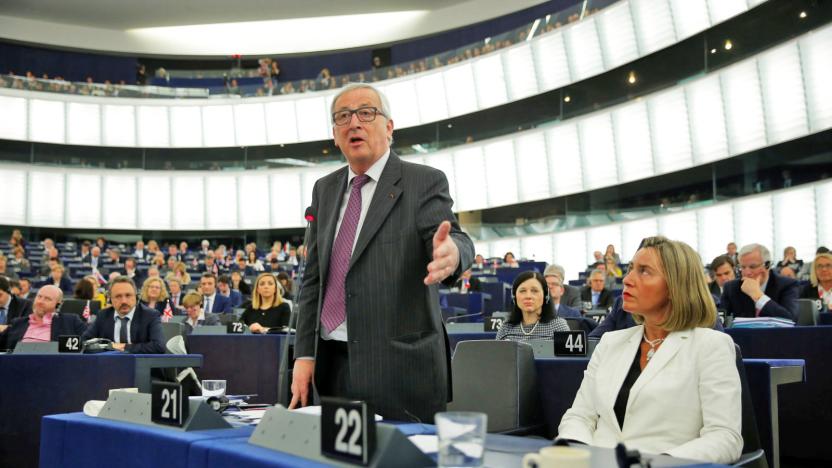EuCommission
Latest

EU fines ASUS, Philips and others for online price fixing
Days ago, the EU Commission fined Google a record-setting €4.3 billion ($5 billion) for antitrust violations. Now it's handed down a combined €111 million in fines to four electronics manufacturers for fixing online resale prices for their devices and appliances, which is a breach of European Union competition laws.

Google fined $5.04 billion for forcing its apps onto Android phones
Europe has imposed a record-setting €4.3 billion ($5 billion) fine on Google for antitrust violations around its Android smartphone operating system. In 2016, the EU Commission charged Google with forcing mobile network operators to install Chrome, search and other Google apps as the default or exclusive search service on most devices sold in Europe. With a market share of over 80 percent in many countries, that effectively locked others out of the search market, creating a near-monopoly for the search giant.

NVIDIA kills its 'anticompetitive' GeForce Partner Program
NVIDIA has canceled the GeForce Partner Program (GPP) just two months after announcing it. The GPP began with little fanfare in early March, but it quickly became clear (thanks to work by HardOCP's Kyle Bennett) that it was more than a simple branding initiative. Bennett showed that GPP was encouraging manufacturers to solely produce PCs and laptops with NVIDIA GPUs inside. Manufacturers could still opt for AMD cards, but they would have to be sold through a different brand. Should a manufacturer not play ball, NVIDIA would at best not include it in marketing efforts, and at worst actively hold back inventory to exclude it from upcoming GPU launches.

EU may follow US push for easier data sharing across borders
Last month, US lawmakers passed legislation updating how law enforcement gets access to native companies' data held overseas. The new CLOUD Act, as it's called, had its supporters (big tech corporations like Apple, Google and Engadget's parent company Oath) and detractors (privacy advocates like the EFF) and redefines how the US negotiates with other nations for corporate information -- including text messages, emails and documents. Now the European Commission has proposed its own version of those rules to speed law enforcement access to data.

EU wants clear drone regulations in place by 2019
For years, countries have been coming up with ways to regulate the use of drones. The US recently flip-flopped on whether people have to register their non-commercial unmanned aerial vehicles (UAVs) with the FAA at all, while China made it mandatory to register drones heavier than 0.55 pounds. Those are just small steps on the journey towards a full-fledged set of regulations for drone use, but Europe has just taken a major step in that direction. The European Commission has released a blueprint of standards that it proposed in November, which will unify laws across the EU and be up and running by 2019.

European Commission set to fine Microsoft over 2009 browser compliance breach
The European Commission is planning to fine Microsoft for its failure to adhere to a 2009 ruling that required the software giant to offer customers a choice of default web browser. The EU Competition Commissioner, Joaquin Almuni, advised the press that a formal proceeding into the breach -- which Microsoft itself acknowledges -- has begun. Reuters reports that should Microsoft be found on the wrong side of the law, that the resulting fine could be as much as 10 percent of its global turnover. Whether the end sum would be as high as this remains to be seen, but given recent events, you can expected some hurried shuffling of paper in Redmond's accounts department.

Orange and T-Mobile UK merger approved by EU, forms 29.5 million customer juggernaut
The European Commission has decided it doesn't mind the crass splicing of pink (okay, magenta) and orange, and has therefore provided its tastefully hued green light to the UK merger of the two mobile operators. Once the transaction is completed this Spring, we'll still be looking at two delineated entities on the consumer market, but there'll be one back office and one consolidated network servicing the two brands. That'll remain the case for at least the next 18 months, when the joint venture between Deutsche Telecom and France Telecom, the respective parent companies of T-Mobile and Orange, will likely complete the process by rebranding itself into one entity. The press announcement is littered with vague references to synergy leveraging and value generation, but those all-important questions as to what the new operator will eventually be called and what colors it will sport are left unanswered. All that really matters for now is that the UK has a new market share leader and the mobile space became that little bit less competitive. [Thanks, Mitchel]

Microsoft accused by EU of harming web browser competition, again
Gulp, here we go again. The European Commission is accusing Microsoft of unfairly dominating its competition by bundling Internet Explorer with its Windows OS. Yup, the very same argument heard in the US courts more than a decade ago after Netscape saw its 86% market share plummet in the face of a bundled IE. The commission, which already fined Microsoft $1.35 billion for anti-competitive practices in early 2008, has published the following preliminary view on the matter: "Microsoft's tying of Internet Explorer to the Windows operating system harms competition between web browsers, undermines product innovation and ultimately reduces consumer choice." Microsoft has 8 weeks to reply to the charge. It's worth noting that while Apple bundles its Safari browser with OS X, Apple commands a much, much smaller share of the operating system and web browser markets globally, particularly outside of the US. The EU's ruling does, perhaps, shed some light on why Apple's App Store is suddenly stocked with a variety of browsers for the hot selling iPhone, eh? Regardless, we have a feeling that the Norwegian cats behind Opera are feeling pretty smug right about now; Google too, as it kicks back licking its Chromium chops on the road to dominating "The Cloud."[Thanks, Marcus]




